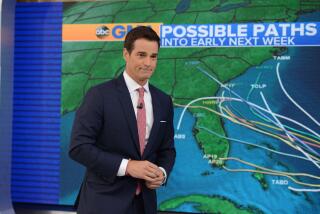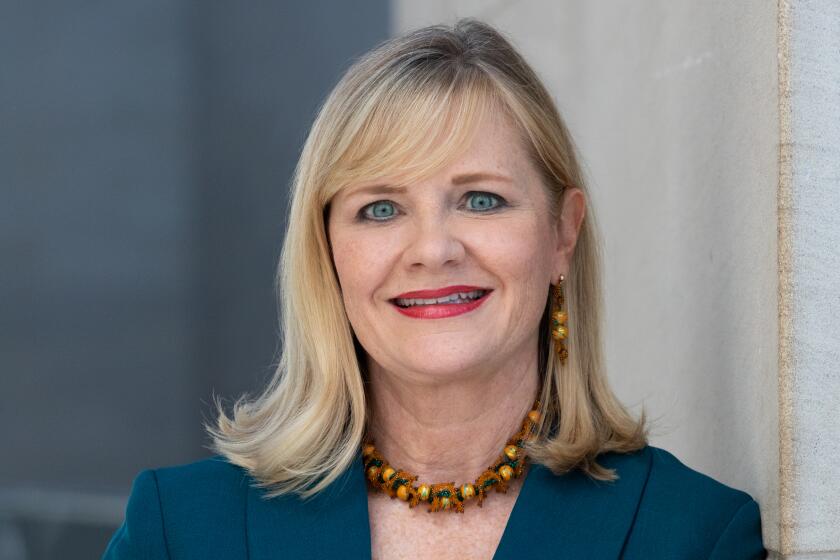Foreign Performers and U.S. Gigs: Getting Here Is a Tougher Ticket
The aftermath of Sept. 11 has created a new kind of MIA: foreign performers missing their engagements in the United States.
Immigration authorities at home and officers at U.S. embassies abroad have intensified security checks to keep out potential terrorists; consequently it can take months longer to issue the clearances foreigners need to get into the country. Some have been denied entry; others haven’t made it through the maze in time.
For the record:
12:00 a.m. July 25, 2002 For The Record
Los Angeles Times Thursday July 25, 2002 Home Edition Main News Part A Page 2 National Desk 15 inches; 537 words Type of Material: Correction
*Festival director--Walter Nick Durkacz is in his fourth year as festival program director for the Central Park SummerStage performance series in New York City. An article in Monday’s Calendar about foreign artists missing performance dates in the United States incorrectly stated his title and tenure with the series.
*
Since June, venues from Lincoln Center in New York to California Plaza and the Conga Room in Los Angeles have felt the impact.
Those unable to gain entry have included a Welsh harpist who was going to perform at a small festival in Pennsylvania and an English player of the sackbut, a medieval wind instrument, who failed to make it to UC Berkeley. Eliso Virsaladze and Alexander Melnikov, two pianists from the former Soviet Union were supposed to help the Newport Music Festival in Rhode Island uphold its tradition of presenting U.S. debuts of classical musicians. Not this time.
The Lincoln Center Festival has been hit hardest: 10 players in a 28-member Iranian theater troupe, including one of the lead actors, did not make it past the U.S. consulate in the United Arab Emirates. Officials there ruled that the 10 were a risk to remain illegally in America, festival director Nigel Redden said. That forced Lincoln Center to reconfigure its U.S. premiere of a cycle of “Ta’ziyeh” plays, traditional musical-theater works based on Shiite lore.
The Lincoln Center Festival took a second hit when the Paris-based Algerian singer-guitarist Souad Massi bowed out. Redden said that her partner, a Moroccan, was held up because of a waiting period imposed after Sept. 11 on visa applicants from 26 Muslim nations in North Africa, the Middle East and East Asia; Massi did not want to travel without him.
World music fans in L.A. last month missed what was to have been the Southern California debut of Toto La Momposina, a Colombian singer-dancer billed as “The Queen of Cumbia.” Her agent, Alison Loerke, described a bureaucratic nightmare of documents being misplaced and delayed by immigration authorities; the mess could not be untangled in time for Momposina’s scheduled June 24 concert at the Conga Room.
Cheika Rimitti, an Algerian rai singer, made it to California Plaza for a free concert on July 13, but she was missing her keyboard player and a guest singer, Cheb Sahraoui. They were held up by the new 20-day security waiting period for North Africans and Middle Easterners, said Walter Nick Durkacz, the New York City festival director who handled visa arrangements for Rimitti’s tour.
Durkacz, who has directed the Central Park Summerstage series for 17 years, said that delays he encountered this year included having the Immigration and Naturalization Service bounce back visa applications because he had signed them in black ink rather than blue, and because he mistakenly had written a check for $135--$5 more than the required application fee.
The INS has been criticized since Sept. 11 for, among other things, granting student visas to the two pilots who felled the World Trade Center--six months after they died carrying out their attack.
“There has been a lot of criticism and they’re playing it extremely by the book because they don’t want to make mistakes,” Durkacz said. “I can’t blame them. We all do things differently now.”
Presenters point to June 1, 2001, as well as Sept. 11 as a milestone on the road to uncertainty for importers of foreign talent. That’s when the INS began offering to ramrod visa applications through the system in 15 days--for those willing to pay a $1,000 fee. Executives of service organizations such as Opera America and the American Symphony Orchestra League say that many of their members can’t afford the fee and that visa approvals that could be obtained in 30 to 60 days early in 2001 now take 100 days or more.
Ron Johnson, a supervisor at the California Service Center in Laguna Niguel, one of four INS centers nationwide that process visa applications, acknowledges the average time for unexpedited visa approval has increased from 75 days early in 2001 to more than 100 days now. The culprit, he said, is global terrorism, not the “premium processing fee” criticized by arts groups.
It takes five to 10 minutes to run post-Sept. 11 computerized security checks on each visa applicant, Johnson said--a big reason for the slowdown.
In June, he said, the California Service Center received 9,500 applications for temporary worker visas--about 500 of them for artists. Their American presenters must persuade the INS that the performers possess “extraordinary ability” or are “culturally unique” --a process that for many years has generated periodic instances of esteemed but not-so-famous performers being denied entry.
Once the INS has OKd a performer, it is up to officers at U.S. consulates around the world to decide whether they are trustworthy. Are they apt to break the law? Is there a risk that they will try to use a temporary visa as a portal to illegal immigration? Besides the 20-day security waiting period for those from “countries considered problematic,” as the State Department’s consular affairs spokesman, Edward Dickens, put it, all male visa-seekers ages 16 to 45 must now provide detailed biographical information.
Charlotte Lee, who handles visas for IMG Artists, which has a large roster of classical musicians, said it recently took her more than five hours to help a client from China complete the form.
Jan Denton, executive director of the American Arts Alliance, is trying to educate INS officials about the unique needs of arts presenters--and the potential damage to their reputations and pocketbooks when advertised performers fail to appear. She hopes that will lead to more consistent procedures for evaluating visa applications for artists and more flexible ways of handling emergencies and preventing no-shows.
“We understand that [immigration authorities] are very, very beleaguered. Maybe they’ll understand what we’re up against.”
The INS is not about to streamline anything in ways that would compromise security, said Virginia Kice, spokeswoman for the service’s Western Region. “Nobody wants to make a mistake that has awful repercussions.”
Arts presenters fear that without relief from visa delays, some foreign performers may give up on the U.S.--and that some American producers may balk at booking lesser-known artists, or ones from hot-spot nations, for fear they won’t get through the system.
“The last thing I want is to let that be a decisive factor in what we program,” said Redden, the Lincoln Center Festival director. “But at some point it may come to that.”
More to Read
The biggest entertainment stories
Get our big stories about Hollywood, film, television, music, arts, culture and more right in your inbox as soon as they publish.
You may occasionally receive promotional content from the Los Angeles Times.







